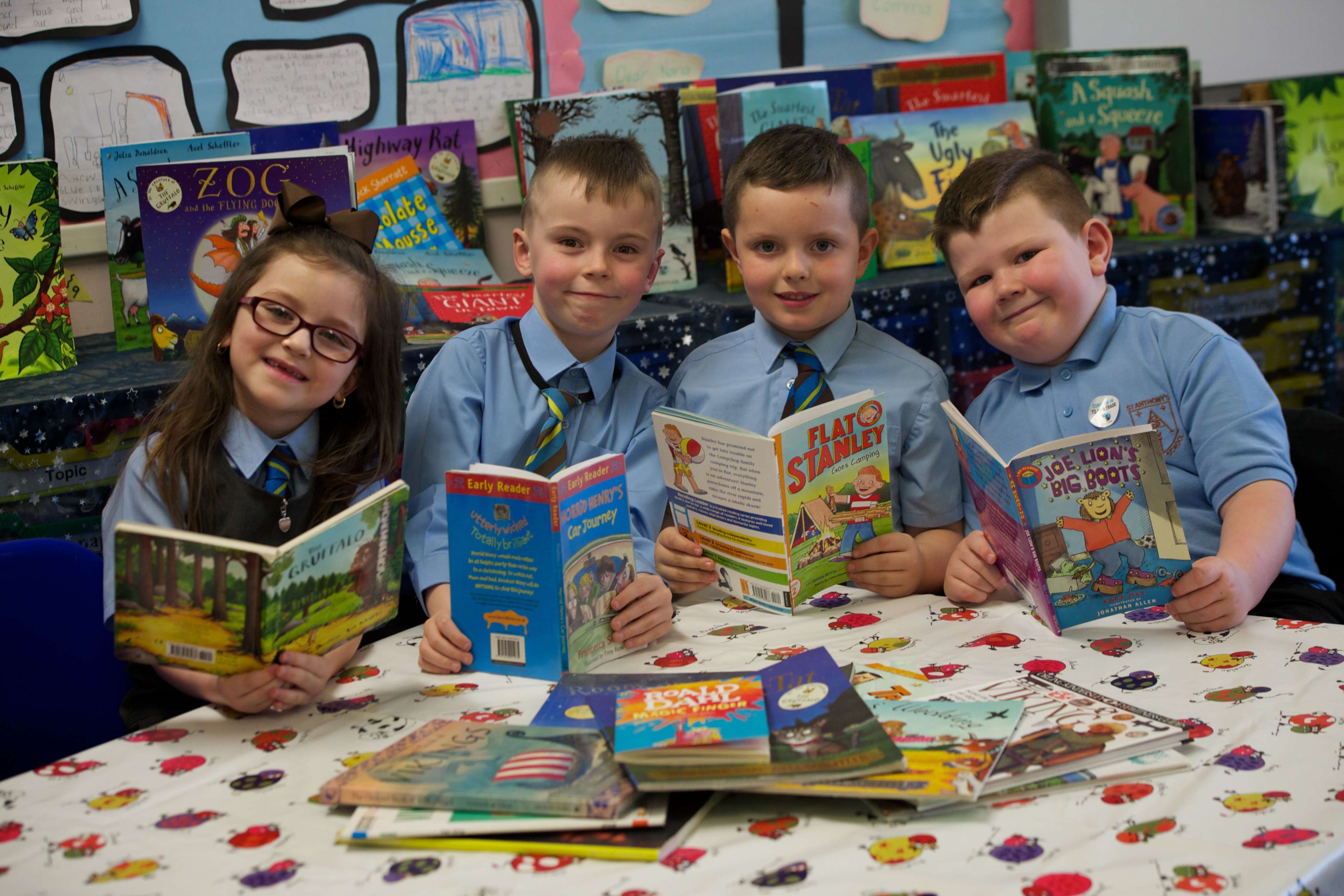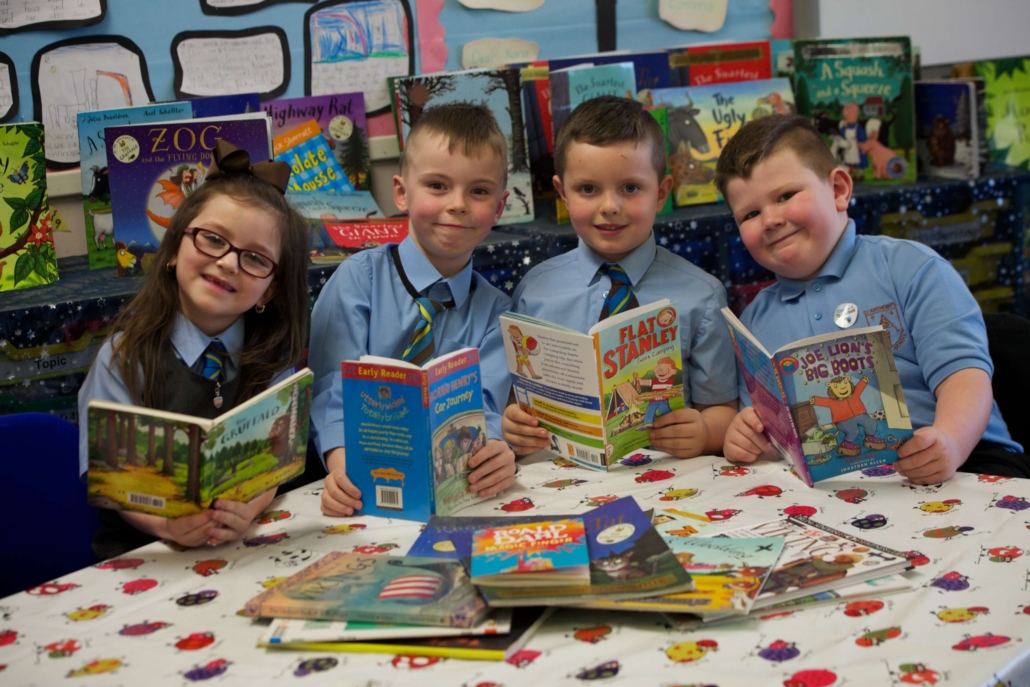Education Scotland inspection hails progress in improving literacy, numeracy and work to close the poverty-related attainment gap
Renfrewshire Council is the first local authority in Scotland to be rated ‘excellent’ for its progress in improving learning, raising attainment and narrowing the poverty-related attainment gap as part of the Scottish Attainment Challenge.

Education Scotland published its inspection report today (Tuesday 19 February 2019) on progress in Renfrewshire and found significant year-on-year improvements in listening, talking, reading, writing and numeracy, with the attainment gap closing across all measures.
Renfrewshire is one of nine ‘challenge authorities’ in the Scottish Government funded Scottish Attainment Challenge, to close the attainment gap between those living in Scotland’s least and most deprived areas.
The report praises the “very successful” evidence-based, universal approach which sees support extended across all 62 primary, secondary and Additional Support Needs schools in Renfrewshire, a region where 27% of pupils live in Scotland’s most deprived areas.
Citing ‘highly effective leadership’, ‘excellent governance’ and a ‘shared vision’, it praises the culture where all staff are empowered to improve outcomes for pupils, their families and communities.
Renfrewshire Council Depute Leader Jim Paterson, Convener of Renfrewshire’s Education and Children’s Services Policy Board, said: “This is an exceptional endorsement from Education Scotland and testament to the innovative way Renfrewshire is raising attainment for all children and young people while also closing the poverty related attainment gap. We are delighted that significant progress has been shown in both measures.
“Our success is down to a collective approach. Children and young people have gained belief in themselves and I want to thank them and their parents and carers for their effort and commitment to learning. Our Children’s Services team has, through outstanding governance and leadership, also provided the right support and created the space to allow schools to deliver high quality learning and teaching.
“And staff in schools have once again shown their commitment to doing the best for our children by committing the energy and drive to deliver innovative approaches which are changing the opportunities for Renfrewshire children both during their school years and for their choices when they leave school.”
Deputy First Minister John Swinney said: “Improving the education and life chances of our children and young people is the defining mission of this government. Central to this is the Scottish Attainment Challenge which is supporting hundreds of schools to develop approaches to improve literacy, numeracy and health and well-being that help close the poverty-related attainment gap.
“I would like to congratulate Renfrewshire Council on becoming the first local authority in Scotland to be rated ‘excellent’ for their progress in closing the poverty-related attainment gap. It is clear that the close collaboration between their dedicated and empowered workforce and their wider school communities is having a significant and positive impact.
“These results are extremely encouraging and I look forward to seeing how the local authority builds on this momentum to truly ensure that every child in Renfrewshire is given the best possible start in life, no matter their background.”
As a Challenge Authority, Renfrewshire has received £10.4million in Scottish Government attainment challenge funding since June 2016 and has achieved an 11 percentage point increase in expected levels of literacy and a 5 percentage point increase in expected levels of numeracy from 2015-2018. Over the same period, the poverty-related attainment gap has reduced by 6 percentage points in literacy and 4 percentage points in numeracy.
The report highlights Renfrewshire’s ‘outstanding approach’ in using data to inform improvements, with data mentors in every primary school and principal teachers for raising attainment in each secondary school, helping build staff expertise in data analysis.
Gayle Gorman, Chief Inspector of Education for Scotland, said: “Closing the attainment gap is vital for a modern, successful Scotland and that is why, since late 2017, Education Scotland’s Inspectors have been working in partnership with Audit Scotland with the goal of reporting on the progress made by local authorities in improving learning, raising attainment and closing the poverty-related attainment gap.
“These reports are vital to learn and share how well local authorities are doing and it is an absolute delight to see Renfrewshire Council’s report. Everyone should be delighted to see the impact of their work on children and young people. The clear and consistent
focus on improving aspects of literacy, numeracy and health and wellbeing is helping to meet more effectively the specific needs of individual pupils.
“No doubt this is in part to a number of strategic approaches, in addressing the impact of poverty on the outcomes of children, young people, their families and the community. Addressing this impact has also been key and the improvement plan reflects very clearly the council’s strong commitment to early intervention together with the council’s very successful strategy of using universal approaches to raise attainment for all, alongside targeted interventions to close the poverty-related attainment gap.
“The commitment and focus of Renfrewshire Council on developing high-quality learning and teaching and leadership at all levels has led to improvements in children’s and young people’s learning and progress. I am particularly pleased to hear of the work being undertaken to listen to the voice of children and young people to help shape improvement in the authority. I am also very aware of the hard work that will have been undertaken by teachers, support staff and communities to achieve this success and would like to thank all of them for their commitment to improving the life chances of Scotland’s children.”
Hundreds of Renfrewshire staff have benefited from professional learning which is described in the report as ‘sector-leading’, including leadership development for headteachers and senior school staff and specialised literacy and numeracy training for classroom assistants.
Initiatives which have delivered success include pizza family learning, where more than 300 family members have enjoyed tea-time study sessions which look at literacy and numeracy.
A Cost of the School Day fund sees parents and school staff work together to ensure all children can take part in school activities and participate fully in their school.
More than 3800 pupils from 27 schools have also benefited from the PATHS programme which develops self-control and has seen a significant reduction in anti-social behaviour, while 49 schools so far have worked with the educational psychology service to embed a nurturing approach which helps children to learn and develop socially and emotionally.
Strong relationships have been built between schools and parents, encouraging greater family and parental engagement, with inclusion support assistants to help pupils struggling with attendance, school engagement or difficult home circumstances.
Steven Quinn, Interim Director of Children’s Services, said: “The additional resource from the Scottish Attainment Challenge has enabled us to increase the pace and widen the scope of our work to deliver high quality learning and teaching. This is improving attainment and achievement in all Renfrewshire schools, reducing inequalities and improving health and wellbeing for children and supporting young people into positive destinations after school.
“This excellent inspection report reflects the incredible work taking place in our schools and by the central education team to achieve these goals. We have invested heavily in our teachers and in our support staff, recognising the incredibly important role they have in shaping children and young people’s lives. We will now build on this progress and ensure we have the plans in place to continue this great work.”
The different initiatives were delivered and evaluated in partnership with experts at the University of Strathclyde while the Council’s education team also worked closely with the Robert Owen Centre at the University of Glasgow to co-ordinate work that delivers the maximum impact.
Professor Sue Ellis, from the University of Strathclyde’s School of Education, said: “The Renfrewshire Literacy Approach is evidence of the successful partnership between the University of Strathclyde and Renfrewshire Council and has addressed real-life, complex problems of practice and led to improvements year on year.
“It has made a real difference to the children of Renfrewshire by raising attainment, improving learning and narrowing the poverty-related attainment gap. Everyone from academics, head teachers and teachers, local authority staff and classroom assistants, worked on introducing a diverse range of children’s literature, as well as learning and teaching activities that engaged children on all levels. That valuable work has generated knowledge about effective literacy teaching and project implementation, as well as assessment and leadership, that can now inform policy and practice across the whole of Scotland.”
Professor Chris Chapman, Director of Policy Scotland at the University of Glasgow and Co-Director of the Robert Owen Centre, said: “The Robert Owen Centre for Educational Change has been working with key local authority leaders to develop a shared vision and understanding of the complexity and challenges of closing the poverty related attainment gap.
“We supported the development of Renfrewshire’s strategic approach, working with key partners to optimise the impact on children and young people’s outcomes. We’re delighted Renfrewshire’s approach and commitment to the major challenge of our time has been recognised in this inspection report.”


